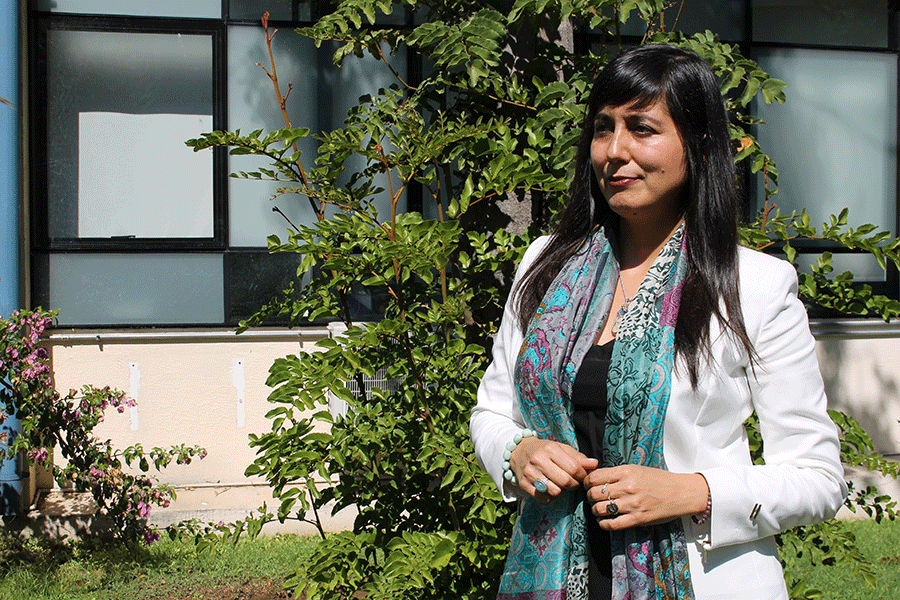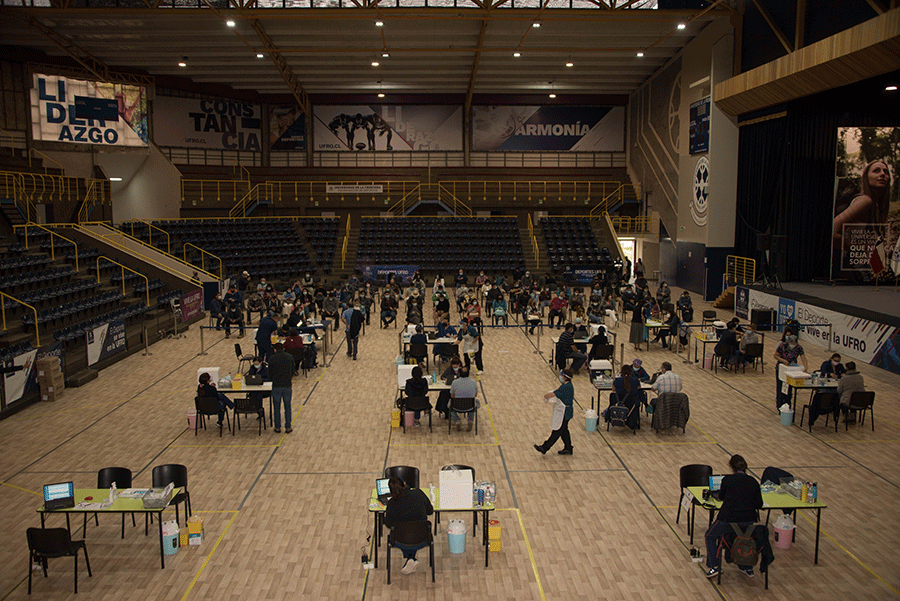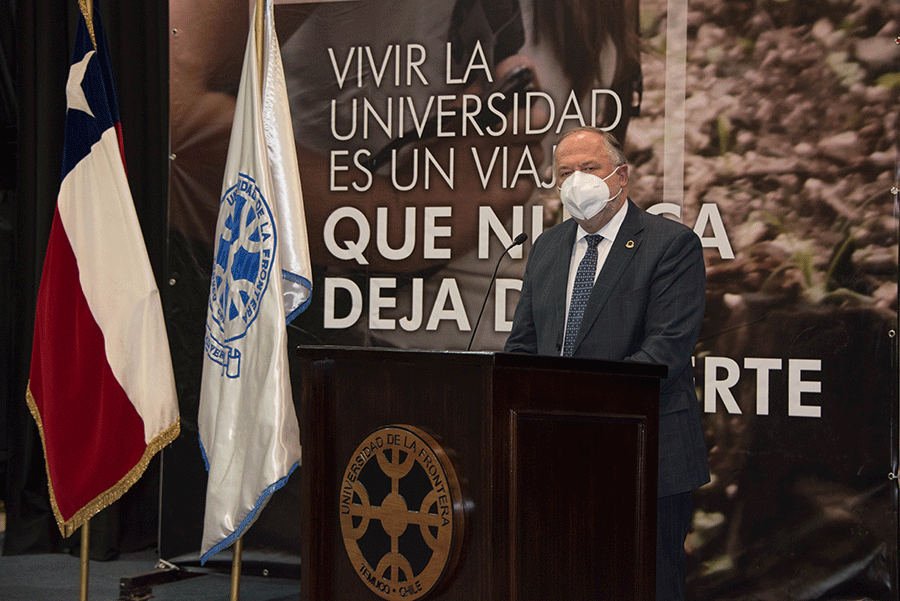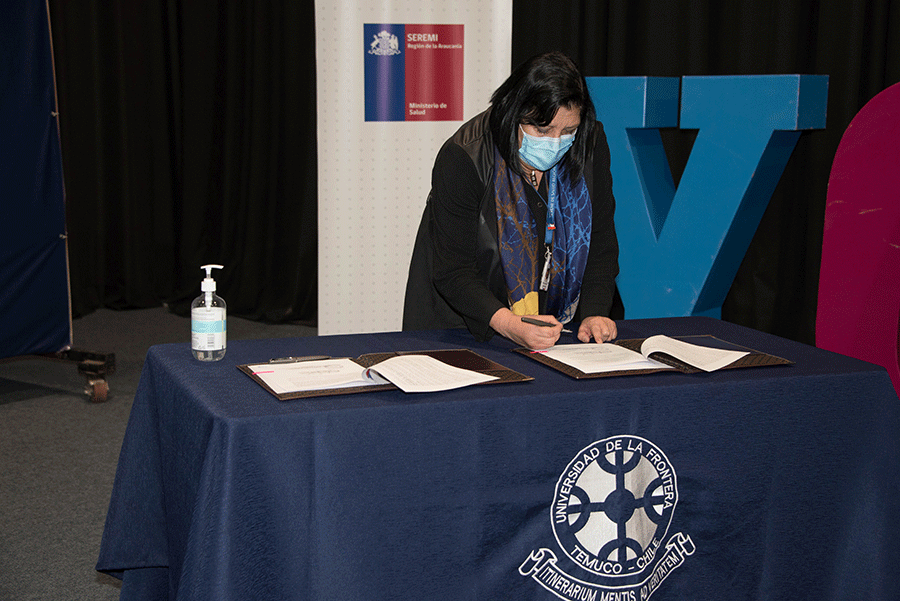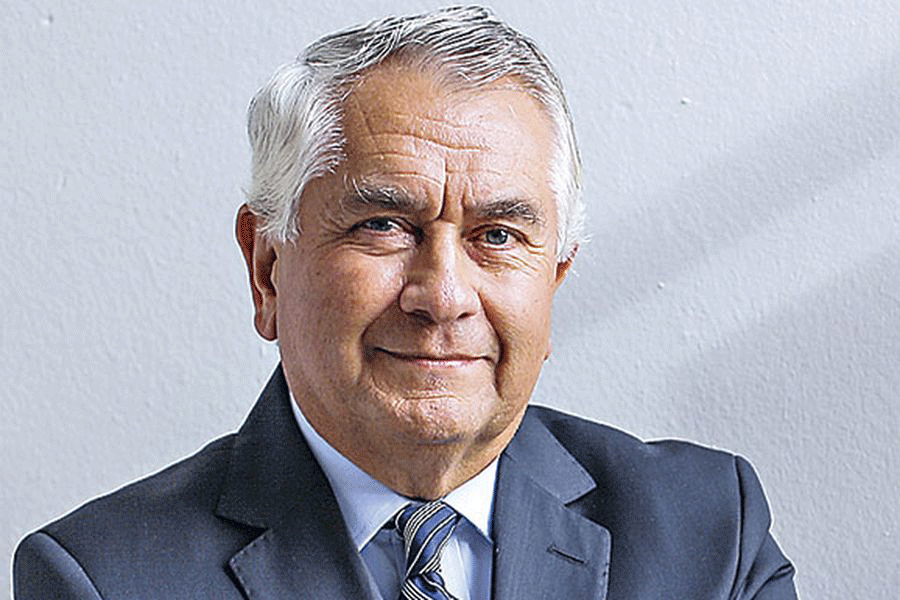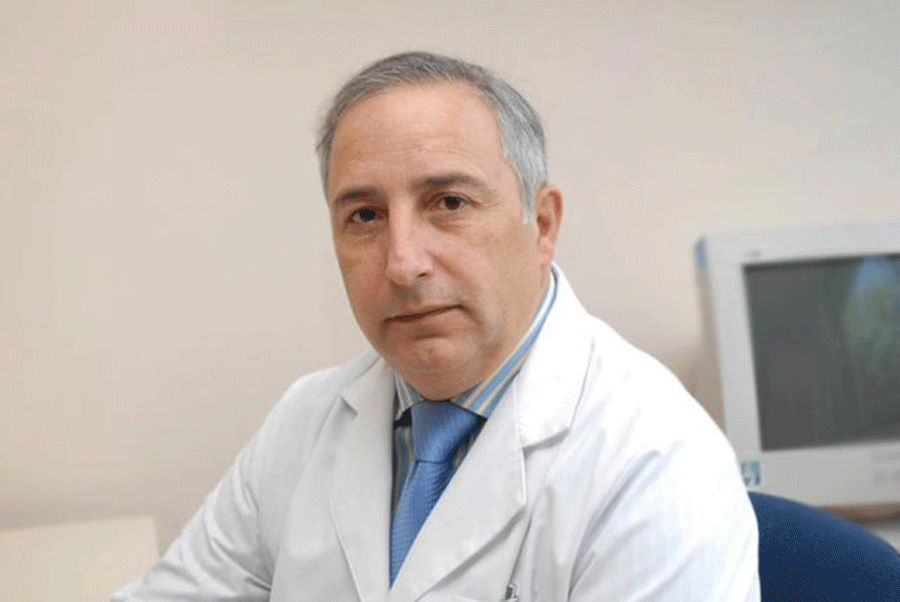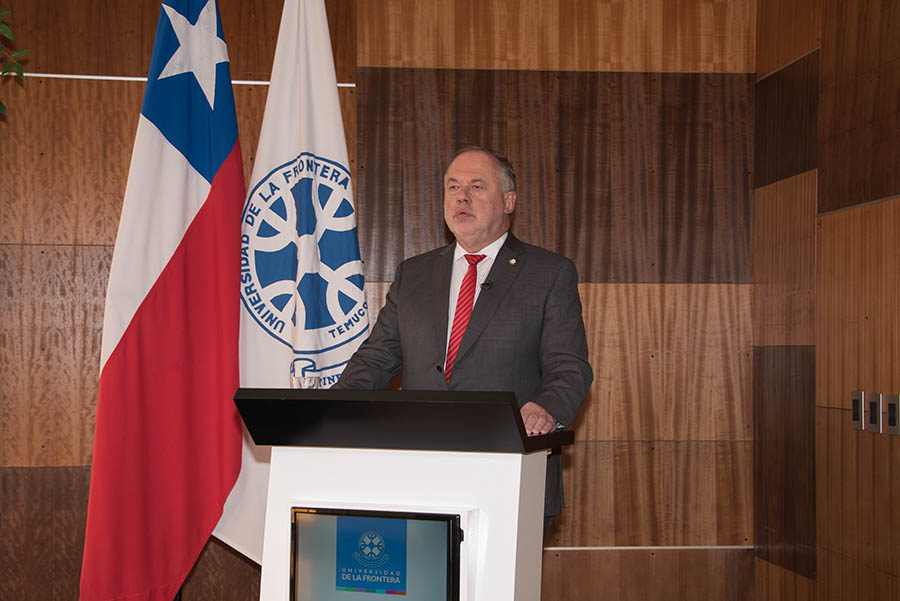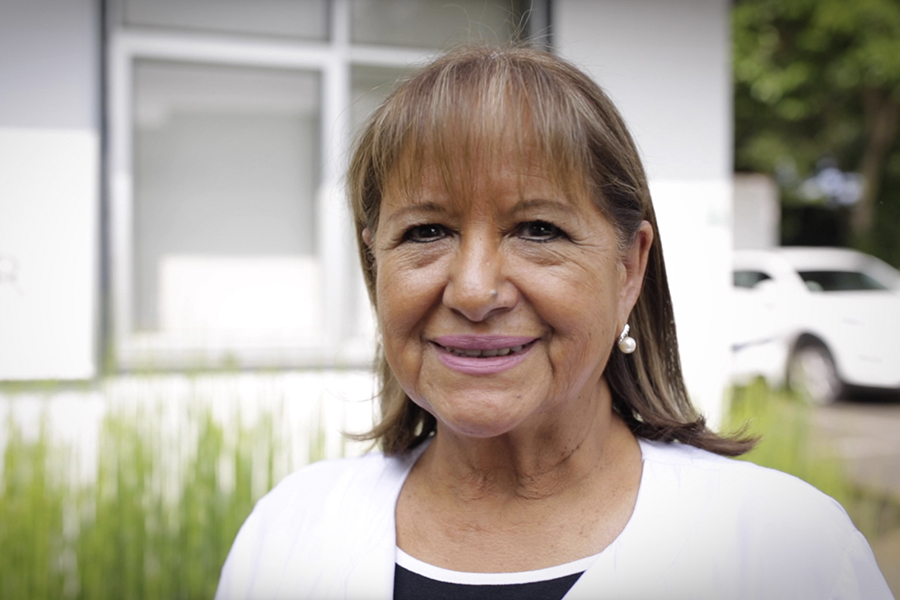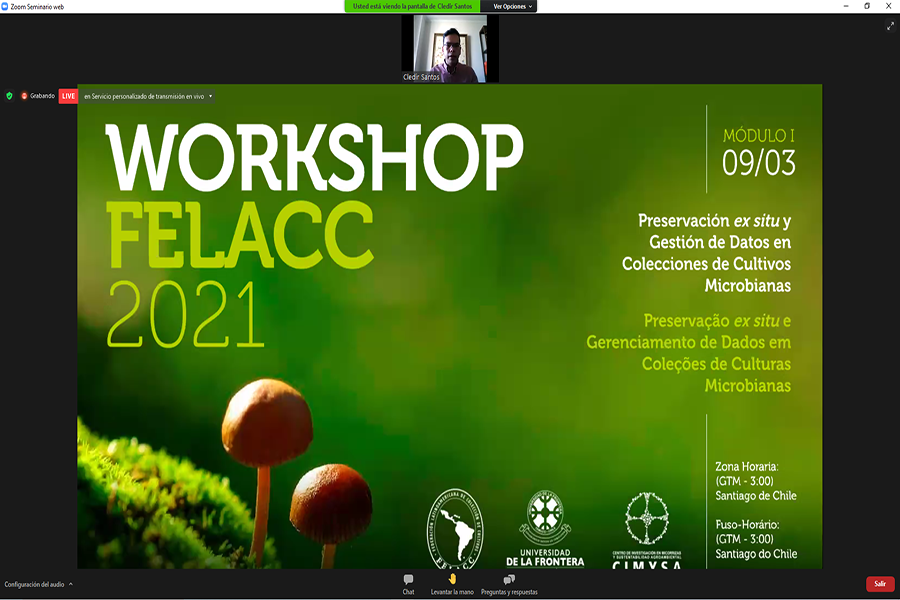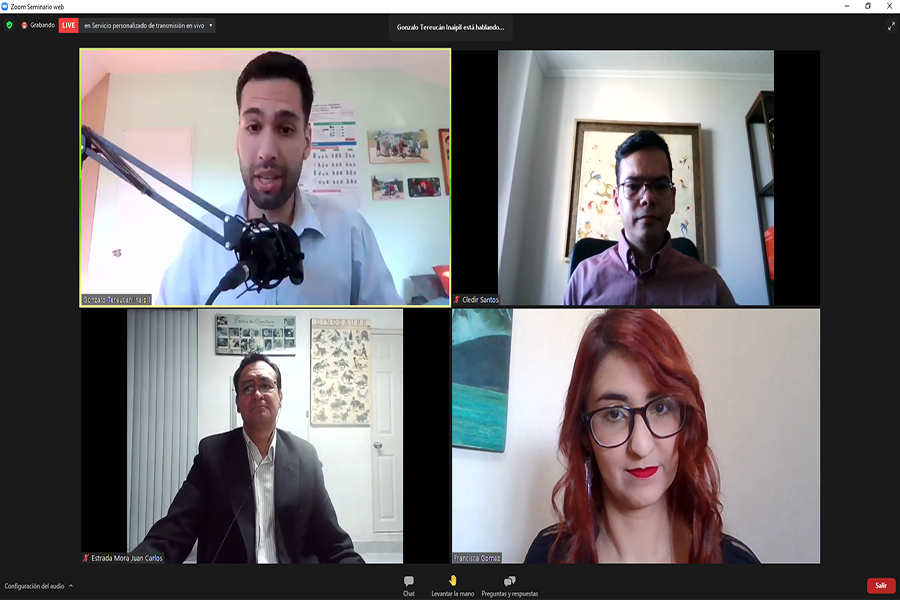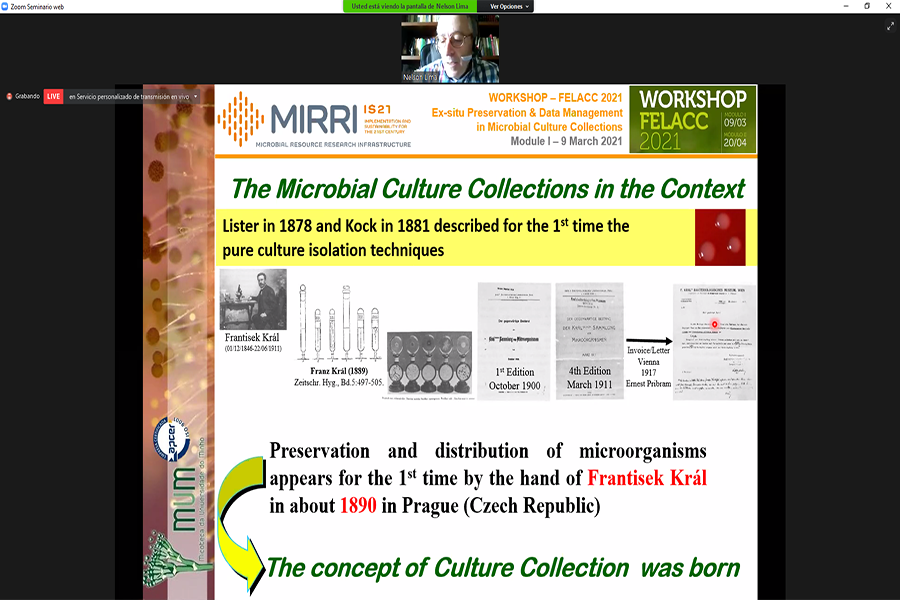|
With this scholarship, Dr. Carolina Navarrete González will carry out a research stay at the Department of French, Hispanic and Italian Studies of The University of British Columbia in Vancouver, Canada. |
Dr. Carolina Navarrete González is the academic coordinator for the research field of Cultural Studies, Discourse and Communication of the Doctorate in Social Sciences of the Faculty of Education, Social Science and Humanities of the university Universidad de La Frontera (UFRO) and has now been awarded the Chile Crea Scholarship 2021 through her project “Promotion of reading and women's writing, with an emphasis on contemporary narratives of the self”, which is funded by the Chilean Ministry of Culture, Arts and Heritage, through the Regional Ministerial Secretariat for Culture and Arts of the Araucanía Region. This scholarship is for a research stay at the Department of French, Hispanic and Italian Studies of The University of British Columbia (UBC) in Vancouver, Canada, where she is going to work together with Dr. María Adelaida Escobar-Trujillo, a novelist and specialist in women's narratives of the self and researcher in transatlantic studies of culture and literature, gender studies, and personal and historical memories. The research stay of Dr. Navarrete is also linked to her Fondecyt project Nº 11190799 “Stitching loose pieces of oneself together: towards poetics of details in the writings of the self of contemporary female authors (1990-2018)”, and the initiative “Chair of Narratives of the Self” of the research field coordinated by herself in the Doctorate in Social Sciences, which has the support of the Vice-Rectorate for Research and Graduate Studies and the Faculty of Education, Social Science and Humanities of UFRO. This great opportunity to learn from her peers at UBC, which is ranked as the 34th best university in the THE World University Ranking, will allow Dr. Navarrete to move forward with her research in the field of “Narratives of the Self” and to get to know a transatlantic perspective, as well as the personal, social and historical memory of women. Besides, it will allow her to establish significant partnerships with prestigious international experts in her field of studies. Written by: Faculty of Education, Social Science and Humanities, UFRO
|
|
This new vaccination location has a capacity for between 1,000 and 1,200 people a day, thus contributing to the fulfillment of the vaccination plan which is managed and carried out by the Chilean Ministry of Health and its Regional Ministerial Secretariats. |
Over the next three months, the Olympic Stadium of the university Universidad de La Frontera (UFRO) will be an important COVID-19 vaccination site in the La Araucanía Region. The sports arena and its infrastructure will be a significant contribution to the successful achievement of the national mass vaccination plan. The vaccination process is in full swing in Chile, and in this region, it is led by the Regional Ministerial Secretariat of Health. “Once again, the Universidad de La Frontera supports public health – the health of the people in the La Araucanía Region. The size of this building is a major advantage that helps us to continue to move forward with this strategic vaccination process, which is key if we want to contain this pandemic. We want to thank UFRO, its Rector, its authorities and the whole university community for offering this possibility and thus helping us with the vaccination process,” said Gloria Rodríguez, the Regional Minister of Health in the La Araucanía Region, during the inauguration of this new vaccination location, where the commodatum agreement for the premises was signed. The Rector of UFRO, Dr. Eduardo Hebel Weiss, emphasized the cooperation with the health authorities of the region since the beginning of the pandemic, making available all the existing capabilities of the university in the fight against COVID-19. “It is an honor for our university to contribute to the public health of the region and the country. No matter what happens, we will always be willing to cooperate in any strategy the health authorities consider appropriate,” Dr. Hebel said. COLLABORATIVE WORK As part of its institutional commitment with the region and the country, UFRO has contributed in the fight against COVID-19 with numerous different actions and work teams since March 2020. Some of the examples are the manufacturing and delivery of face shields, the development of a mechanical ventilator prototype, the provision of two laboratories for the evaluation of COVID-19 tests, the implementation of a corona tracing center, the significant efforts of the research team regarding the clinical trial for CanSino Biologics’ Covid-19 vaccine, etc. HERD IMMUNITY STRATEGY The vaccination of all citizens appears to be the key to contain the pandemic and its lethal effects. The inoculation of 80% of the population will stop the transmission of this virus. This is why it is important to follow the indications of the health authorities and to continue with the self-care measures: hand hygiene, use of masks and social distancing. “This vaccination consists of two doses, after which you have to wait at least a month to develop good immunity, maintaining the mentioned self-care measures. In our opinion, it is important that the entire population is vaccinated as soon as possible, because once 80% of the population is vaccinated, we will be able to achieve the so-called herd immunity, which should interrupt the transmission of the virus. In this respect, the support of the Universidad de La Frontera so far is fundamental to reach our goal as soon as possible,” concluded Gloria Rodríguez. Written by: Communications Office, UFRO
|
|
The Chilean Minister of Health highlighted the research led by Dr. Fernando Lanas and Dr. Sergio Muñoz of the UFRO Faculty of Medicine in his report on the pandemic on Thursday, March 11. |
The Chilean Minister of Health, Dr. Enrique Paris, highlighted the work of the university Universidad de La Frontera (UFRO) in his latest report on the pandemic, as well as the possibility that the CanSino vaccine might soon be available in Chile, once it gets approved by the Chilean Institute of Public Health (ISP). “During the first week of April, the scientific evidence of the CanSino vaccine will be presented for its approval by the experts of ISP. The clinical trial for this vaccine in Chile was carried out by regional universities, where the efforts of UFRO stood out. This is the most important clinical trial that has been carried out in Chile and we hope that the CanSino vaccine will soon be available for everyone, once it gets approved,” the Minister of Health explained. According to Dr. Wilfried Diener, the Dean of the Faculty of Medicine, the statement of the Minister of Health recognizes and reinforces the work and mission of the Universidad de La Frontera. “It is only fair to say and recognize that the mission of our public universities is to serve our population and to overcome major health problems, such as the current pandemic. Thus, we must work together with the different state institutions for education and health, inspired by the responsibility we bear towards society,” he added. Dr. Fernando Lanas commented that “the results of the study are very positive, so if the vaccine gets approved by ISP, it would be arriving in Chile by the end of the first semester”. In this context, last Thursday, ISP officially confirmed the receipt of the request from the Chinese laboratory CanSino for the authorization of the use of its vaccine against Covid-19. Written by: Fabián Aguirre Silva |
|
On this anniversary, the Rector of UFRO invites the university community to strengthen the dialogue between the past and the future, between tradition and innovation, and to keep working in order to provide the La Araucanía region with a university that stands by its community and that has a solid national and global presence. This year, the remarkable researcher Jennie Risopatrón has been awarded with the Medal for an Outstanding Academic Career, which is the highest honor given by the Universidad de La Frontera. |
The Rector Dr. Eduardo Hebel Weiss inaugurated the academic year 2021 at the university Universidad de La Frontera (UFRO) and officially initiated the celebrations of its 40th anniversary by recognizing the professionals of the Temuco campuses of the University of Chile and the State Technical University, which, after their merger 40 years ago, gave birth to this institution, which now is known for its excellence and as a leader in the training of highly qualified professionals in the south of Chile. One of the missions of UFRO is to contribute to the development of the region and the country through the generation and transmission of knowledge and to make it available to society. In this context, Dr. Hebel emphasized that the success of this task is reflected in today’s role of UFRO at the national and regional level, where thousands of its graduates are leading the processes of transformation that the society needs, with a seal of excellence. “They are our greatest indicator of quality. Thanks to them, we can truly say that the Universidad de La Frontera is a university of excellence that leaves its mark,” he explained. 2021: A YEAR OF CHALLENGES A global pandemic and a socio-political scenario characterized by multiple election processes at the national level are some of the elements that will mark this 2021. In order to meet the innumerable challenges that this academic year will bring, Rector Hebel pointed out that the university management will keep working with a focus on support and service as key elements. “Our university’s governing body has always put a focus on the people, since they are the main key of our daily tasks, as well as on collaborative work, and we must continue to do so in our large and our small daily tasks. That is and has been the commitment I made when I assumed my position as the Rector of UFRO,” he pointed out. It is worth mentioning that this year, UFRO is facing a decisive year regarding the renewal of its Statutes, a process that has been ongoing and that is crucial for the functioning and strengthening of the university. At the same time, he invited the staff “to keep working with commitment and efficiency, which is crucial for the university’s performance. Each and every one of you makes it possible that the numerous processes at our university work. Without you, we would not be able to fulfill our commitment to excellence”. “We have invited you to turn your time at UFRO into one of the best experiences of your life, although our plans often turn out to be different from reality. You are the ones who make up the university and your experience in this training process will depend on you and how you confront these challenges. As the Rector of this university, I can assure you that we will do everything possible to keep up our tradition of quality and excellence during the academic year 2021,” Dr. Hebel said, addressing the students at UFRO. Finally, he invited the university community to participate in the different activities that will take place over the year to celebrate the 40th anniversary of UFRO. The program will be inclusive and participative, “reflecting our identity as a regional, public and state university,” he concluded. UFRO MEDAL FOR AN OUTSTANDING ACADEMIC CAREER This year, the UFRO Award for an Outstanding Academic Career was granted to MSc Jennie Risopatrón González, a state teacher with specialization in Biology and Sciences, academic of the Department of Basic Science of the Faculty of Medicine, and currently the director of the Center of Excellence in Biotechnology on Reproduction (CEBIOR) at UFRO. She received the highest honor given by the Universidad de La Frontera for her outstanding academic performance in undergraduate and graduate education and research. “I am very grateful to all of you who chose me to receive this honor. It makes me proud and deeply touches me, because it is the highest recognition I can receive from my colleagues. It is a strong confirmation that my passion and work have not been in vain. If UFRO was a person, I would thank it. This university really is an alma mater for me that made me very happy during my whole working life,” Jennie Risopatrón said.
Written by: Communications Office, UFRO
|
|
As part of an alliance established between the Latin American Federation for Culture Collections and the Faculty of Engineering and Science of the Universidad de La Frontera, an international workshop has been organized that already brought together more than 500 people who are working in the field of microbiology and other related fields. |
More than 500 researchers, academics, specialists, students, etc. from different countries participated in the first Module of the Workshop “Ex situ Preservation and Data Management in Collections of Microbial Cultures”, organized by the Latin American Federation for Culture Collections (FELACC) in collaboration with the Faculty of Engineering and Science (FICA) of the university Universidad de La Frontera (UFRO) and with the support of the UFRO Research Center for Mycorrhizae and Agri-environmental Sustainability (CIMYSA). The online event brings together the international scientific community that is interested in the ex situ preservation of microorganisms (outside their natural habitat) and in data management in the field of collections of microbial cultures. The objective of this event is to strengthen and/or expand the collaborative networks in this field of research. UFRO-FELACC ALLIANCE FELACC was created in 2004, as an organization of experts in microbiology, who are interested in the exchange of ideas, knowledge, and information related to the ex-situ preservation of microbial cultures in Latin America and the Caribbean. Since 2018, Dr. Cledir Santos, an academic of the Faculty of Engineering and Science at UFRO, is part of the FELACC Executive Board. That way, he was able to build valuable networks and to establish a partnership between the Federation and UFRO. “We do have expertise and know-how in the field of ex situ preservation of microbial resources at the Department of Chemical Sciences and Natural Resources of UFRO, with about 15 years of experience. During that time, we were able to build a solid international network with partners all over the world,” Dr. Santos explains. In this context, Dr. Santos adds that “UFROs part in the organization of these two Modules of the workshop allows us to show the local, national and international community our work in the field of ex situ preservation and data management in collections of microbial cultures. We are already internationally recognized and that’s not only because of our participation in different international organizations, but especially because of our scientific expertise in this field”. He also points out that “this has been possible because of the ethical work we have done when it comes to maintaining and preserving the microbiological material and information related to the research and technological development of our peers. In addition, our work has been supported by the scientific expertise of our international peers. Thus, we have been very consistent in our scientific work for the past 15 years.” WORKSHOP MODULES This workshop has been organized in different modules and the first two are in Spanish and Portuguese, since FELACC realized that there is a certain need for training in ex situ preservation of microorganisms in Latin America. “We know that English is a universal language in science and we hope to be able to carry out other similar activities in that language in the near future, so we could invite experts from other parts of the world, too,” Dr. Santos explains. The first module took place on March 9, with the participation of Latin American and European speakers with solid experience in ex situ preservation and data management in collections of microbial cultures. IMPRESSIONS The Dean of the Faculty of Engineering and Science of UFRO, Dr. Rodrigo Navia, believes that it is very important to develop this kind of events for scientific dissemination. He also points out that “it is an honor for us as a faculty to be part of this workshop, because we are very interested in building networks that allow us to raise awareness about the importance of ex situ preservation of microorganisms, and to keep working in this field”. At the same time, Dr. Juan Carlos Estrada, the President of FELACC, emphasizes that “the recent implementation of distance education all over the world is quite beneficial for the Federation and, in this context, I would like to give a special thanks to the Executive Board, the organizing committee and the Faculty of Engineering and Science of UFRO, for their efforts and commitment, which made this workshop possible”. The second module is programmed for April 20. If you want to watch the video of the first module, please follow this link: https://www.youtube.com/watch?v=tJm_1AlTn2E . Written by: Daphne Bormann Parada |





